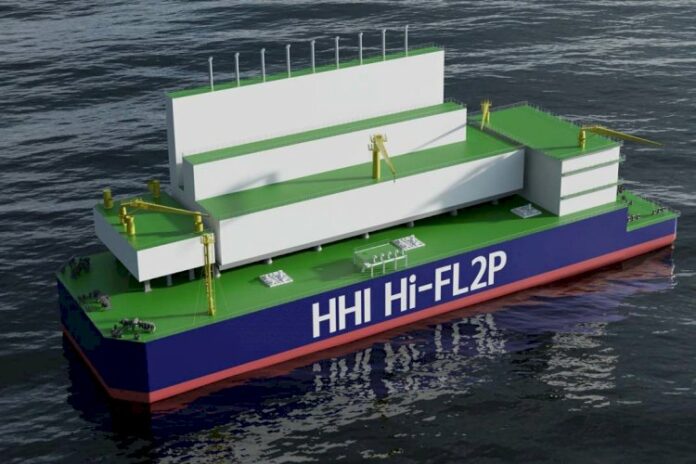Hyundai Heavy Industries Co., Ltd. has been granted Approval in Principle (AIP) from Bureau Veritas for Hi-FL2P (Hyundai innovative Floating LNG to Power solution).
A certificate of Approval in Principle has been provided to Jae-Eul Kim, Chief Technical Officer, Hyundai Heavy Industries Co., Ltd, by Christophe Capitant, Country Chief Executive, Bureau Veritas Korea, in a ceremony held at HHI in Ulsan, the Republic of Korea.
‘Hi-FL2P’ is an ‘All-in-One Type’ Floating LNG Power Plant where all equipment and systems that are required for the power generation and transmission including LNG containment, gas supply system, and power plant are installed in one unit to function as a stand-alone power plant.
The ‘Hi-FL2P’ was developed in a JDP (Joint Development Project) with Bureau Veritas. The project was formally completed with the award of the AIP certificate. HHI is now anticipating an increasing number of orders for All-in-One Type Floating LNG Power Plant and this AIP is an important step in marketability.
Jae-Eul Kim said:
‘HHI strategically selected the “All-in-One, Barge Shaped Power plant, with Dual Fuel Engines”, which provides significantly lower CAPEX than land-based infrastructure and also supports the global demand for environmentally friendly power generation, with the collaboration of Bureau Veritas and the Engine Machinery Division and Offshore Divisions in HHI.’
The HHI development team now plans to be active in meeting global market demand by using the results of AIP with Bureau Veritas and related technical data.
Christophe Capitant said:
‘Bureau Veritas is very proud to have been actively involved in the development of this innovative concept of an All-in-One Floating LNG Power Plant. The technical collaboration between Hyundai Heavy Industries Co., Ltd. and Bureau Veritas has been extremely fruitful and we are delighted it has led to such a positive outcome. The Approval in Principle granted to Hyundai Heavy Industries Co., Ltd. is the first milestone which hopefully paves the way for coming successes in the promising field of floating energy generation.’
The Hi-FL2P developed in this JDP with Bureau Veritas is 164 m long, 48 m wide, and 28 m deep. It has three LNG storage tanks with total capacity 81,000 cubic meters, and also equipped with 2,200 cubic meters of marine gas oil tanks. The unit generate power for its operation as well as for suppling to the land without a continuous external fuel supply facility such as FSRU. To secure a competitive design for broader demands, HHI and Bureau Veritas carried out gap Analysis against classification rules of Bureau Veritas such as Power Plant, FSU, and Winterization based on HHI’s proven LNG Carrier design.
The power generation engine to be used in the Hi-FL2P is the HHI HiMSEN 14H54DFV model, developed and manufactured by HHI’s Engine Machinery Division. Natural gas is used as the main fuel but in the case of an emergency it is also possible to use diesel oil for ships. By using the dual-fuel power generator, the overall operability would be maximized and the cost of an Hi-FL2P unit is significantly lower than that of using gas turbine generators.
On receiving a contract, the hull would be built in the shipbuilding division and the power plant manufactured at the engine machinery division – and installed by using an offshore crane with 10,000 tonne lifting capacity (HD-10000). Being produced and integrated under single company, Hyundai Heavy Industries, and in single location, the cost and schedule will be less with high production efficiency.
Hi-FL2P is more suitable for areas where there is insufficient infrastructure to construct new onshore power plants, or in island areas which are difficult to connect with a main power grid or where temporary/emergency power is required and for cities looking for environmentally friendly power. In addition, it also has viability for areas where environmental authority or community have concern on building onshore power plants. It is expected that the floating LNG power plant market growth will be great in the future especially with shorter duration of construction and with lower investments than onshore power plants.



